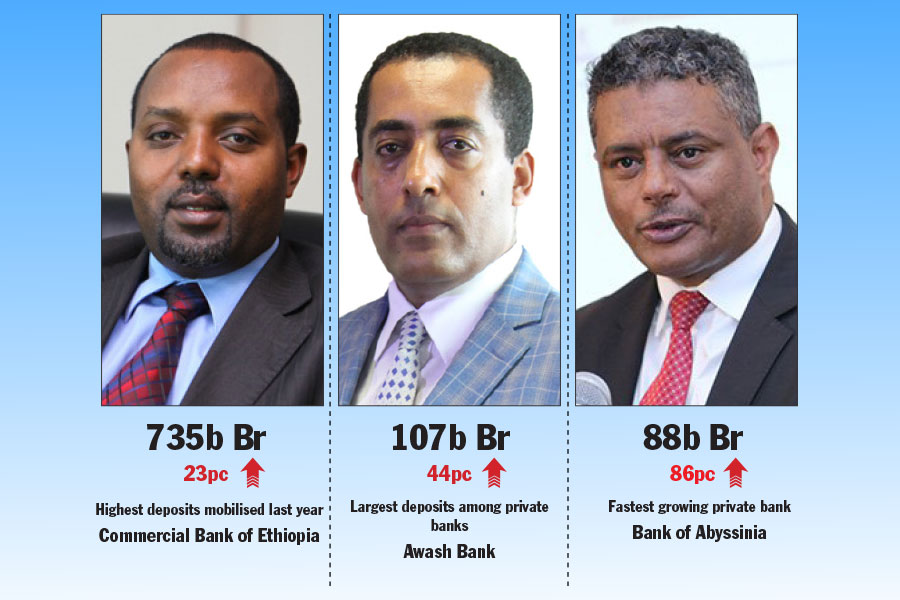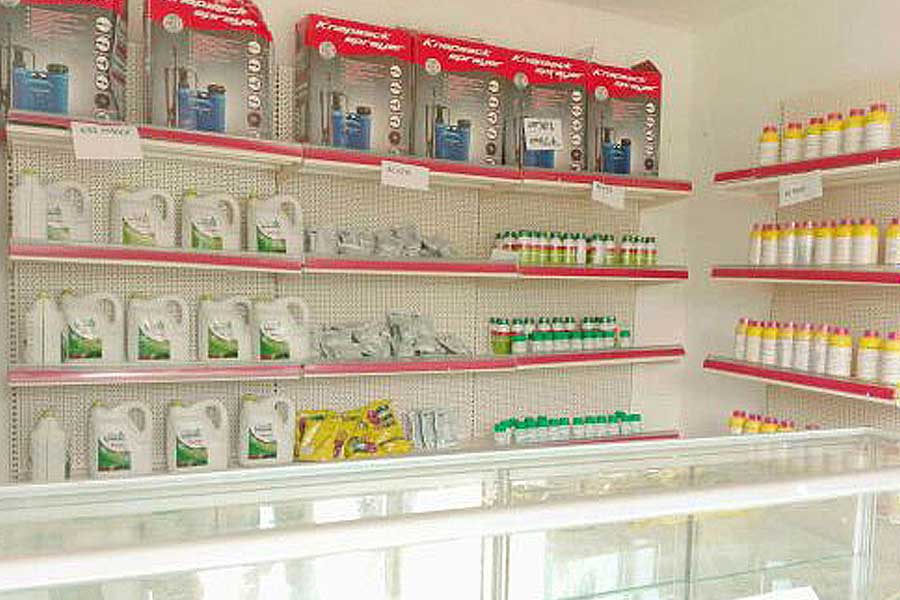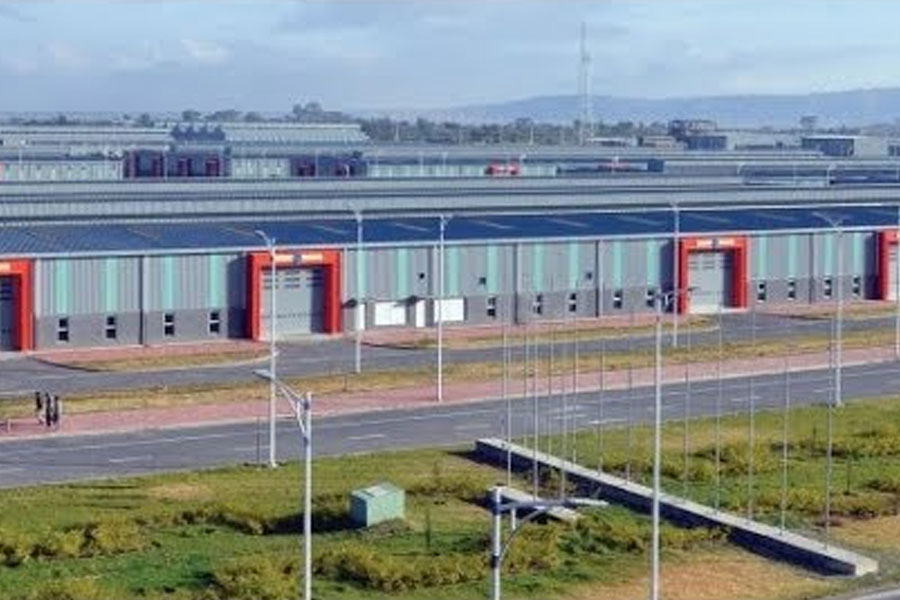
Fortune News | Jul 18,2021
This past Tuesday, the luxurious Sheraton Addis hotel was the venue for a rather unique event hosted by the Ministry of Mines & Petroleum (MoMP). The hotel was bustling with a motley crowd that seemed to have come in from all parts of the country to attend. Security guards could be seen patrolling here and there, signalling that some high-level government officials, including the Minister, Takele Uma, were to grace the occasion with their presence.
Officials as senior as Demeke Mekonne, deputy prime minister and minister of Foreign Affairs, were attending, sending a clear signal that the mining and export of gold is a lifeline to the country's depleted stock of foreign exchange reserve.
An unassuming attendant of the event was Mesfin Kayama. A tall and athletic young man from Derro Woreda in the Southern Regional State, his eyes radiated with excitement, for he, and several others, were there to receive awards and accolades from the Ministry. The federal government acknowledged their contributions in supplying gold to the central bank in what has been a record-breaking year for the Ethiopian mining industry.
The 29-year old artisanal miner, Mesfin, serves as a chairperson of a cooperative under Tibiber Gold Mining Association, which supplied over seven kilogrammes of the precious commodity to the National Bank of Ethiopia (NBE) over the past 10 months. Mesfin was posthaste in sharing what trials and tribulations he and members of his Association faced in getting the mineral out of the earth and into buyers' hands.
When federal authorities announced earlier this month that over six tonnes of gold were exported over the first 10 months of the current fiscal year, bringing in 513 million dollars in export revenues, there was little mention of the daily tribulations facing miners like Mesfin. Security threats, a high risk of accidents, a lack of equipment and infrastructure, and arduous labour are just some of the caveats attached to the gold industry.
One particular incident remains stored in Mesfin`s memory box, a day that he is unlikely to forget anytime soon.
It was almost sunset, and most miners were returning home, he recalled. He was with a friend holding two kilos of gold to be turned in the next day in Mizan Tepi when five guys pulled a gun and knives on them. They threatened Mesfin and his friend, robbed them, and left.
"I couldn't even breathe," he told Fortune. "I thought they were going to kill us." Mesfin`s and his friend's lives were spared but not the gold bars in their possession. They lost gold bars that would take their Association, which operates with 300 miners on one hectare of land, months to extract. It was worth over five million Birr at current international market price levels.
Mesfin and colleagues travel daily no shorter than 50Km from Selemunsheti town to the mining sites. Where there are 38 mining cooperative recognised by the authorities and working in the area, encounters with brigands are regular. Many toil, spending days digging tunnels dozens of metres deep to reach the gold deposits. It makes it hard to breathe, and the miners live in constant anxiety of tunnel collapse, a dreadful prospect made worse by the absence of health facilities anywhere near the mines.
Then job can be cruel. Not long ago, Mesfin and his colleagues buried 20 members in a day, following a tunnel collapse.
"It`s the most horrifying and saddening moment of my life," Mesfin told Fortune.
Nonetheless, his association mined part of the 207Kg gold produced from the Southern Regional State over the past 10 months, placing the region fifth among the regional states known for gold mining. The Oromia Regional State put out a whopping two tonnes to clinch first place, with Benishangul Gumuz following close behind. Surprisingly, the war-torn Tigray Regional State delivered just over 1,400Kg of gold over the same period, ranking third.
According to the Ministry, around a fifth of the country's total geographical area may contain significant gold deposits.
Yet, only a handful of industrial-scale gold mining projects operate in the country, with the majority of the mineral being extracted by artisanal miners like Mesfin, one of the 400,000 artisan gold miners believed to work in Ethiopia. They support an estimated five to seven million livelihoods, with their aggregate output accounting for less than one percent of Ethiopia's GDP, which grew by an average of nine percent a year over the last decade.
These are artisans responsible for more than half of Ethiopia's gold production. It has increased by more than threefold in the last decade, although the volume of gold they sell to the central bank has been going up and down, resulting in the fluctuation of export proceeds from the precious metal.
At 654 million dollars, Ethiopia's largest-ever earnings from the exports of gold were recorded a decade ago. Ever since, foreign exchange revenues from gold have been declining, reaching a historic low of 29 million dollars two years ago. The closure of big mining plants and a surge in contraband activities, with more than 61pc of gold produced by artisanal miners smuggled to neighbouring countries including Kenya, Sudan, Somalia, finally destined to reach the United Arab Emirates, were to blame for the decline, according to the Ethiopian Extractive Industry Transparency Initiative (EEITI).
Alarmed, federal authorities paid attention. Research was committed, and a series of discussions with miners were held over the years. Establishing a command post, a move that is common whenever the country finds itself in a precarious security situation, licensing prospectors willing to pour their hard-earned money into the industry, and an adjustment on the purchasing price of gold by the central bank were amongst measures that were put in place.
Such attempts have been made at a time when the country's biggest mining plants, including MIDROC GOLD and Ezana, are not shipping their outputs to the international market. The most unexpected of the Ministry's announcements was that gold was sold for around 74 dollars a gram, significantly higher than the international market offers, which have hovered between 55 dollars and 66 dollars a gram over the past year. The price sat at just over 60 dollars a gram at the end of last week.
"We've been paying artisanal miners even higher than what they get in the contraband market, which is known for paying a higher premium, and the international market," Fikadu Digafe, vice governor of the central bank, told Fortune. "It`s an action that has helped us buy 10 tons of gold within 10 months."
Minister Takele, who once served as an ornate deputy mayor of Addis Abeba, echoed this.
"The adjustment made on the purchasing price of gold has crushed the contraband market while enabling us to register a record-high performance," he said.
Two years ago, for 24 karat gold with a purity level of 99.9pc, the central bank would have paid 1,234 Br a gram. It has more than doubled recently. The offering for 14 karats of gold with a purity level of 47.4pc has doubled to 1,561 Br a gram.
The reasons for the domestic gold price exceeding the global market could be an added premium value on supplying bullion to the European market, according to Nazrawi Sahledingel, a mining engineer at Lega Dembi, a plant run by MIDROC Ethiopia for over two decades, after it was privatised to the Saudi business tycoon, Mohammed Ali Al-Amoudi, in the mid-1990s.
Bullion can be considered legal tender and is often held as reserves by central banks. They can also be held by institutional investors where the prices they offer for the gold can go above those on the global stock market.
The drastic increase in export proceeds from gold did not come without trouble. Artisanal miners such as Mesfin, credited for the record-high performance registered thus far, face different challenges, from the seasonality of mining activities to the lack of infrastructure.
"The seasonality of mining impacts our productivity," said Mesfin. "Crops are planted in the rainy season, and it is harvested in the dry season. This makes the mining process very difficult and risks our lives."
Lack of infrastructure and equipment makes their work harder and holds back their output.
Ashenafi Deressa from the Chelina Welebo Union of Guji Zone, a cooperative that supplied about 2.3Kg to the central bank, is one such miner. He would have loved to see government-facilitated loans to purchase machinery for washing gold ore that could ease and speed up productivity. To make things worse, most mining sites are located in peripheral areas and very harsh environments, with almost no access to roads, potable water, and health facilities within a reasonable distance. It makes the digging and quarrying processes immensely gruelling. This is further complicated by the absence of water for the mining process (washing), which is a critical factor in mineral production.
"We travel long distances in search of water," says Ahmed Mohammed from Benishangul Gumuz, who contributed 12Kg to the central bank in six months. "This could be provided to us directly."
The large-scale mining firms seem to be having their fair share of trouble as well. The Ministry has revoked the licenses of 63 companies that failed to renew their permits, meet adequate production levels, or pay royalty fees. More than half of these were engaged in mining development, while 25 were given licenses in mining explorations.
The wealthy businessman Dawit G. Egiziabeher, who established a gold mining enterprise in Tigray, and Bizuayehu Tadelle, one of the cement barons in the country who controls majority shares in the National Cement Share Company, were among those that have had their licenses revoked, alongside Bona Ethio-Indian Marble & Mining Factory Plc.
Meanwhile, previously closed mining plants, including MIDROC Gold, which has supplied 531.78Kg to the central bank, have resumed production while those that tarried in the exploring stage are now on the verge of extracting Ethiopia's top export item. Already, gold has overtaken Ethiopia`s flagship export item, coffee, in the export bill of 2.8 billion dollars recorded over the past 10 months, earning a little over half a billion dollars, according to data from the Ministry of Trade & Industry.
This is a remarkable achievement considering that the global mining industry has been in a rut.
McKinsey, one of the world's four leading consulting firms, estimated that the global mining industry lost an estimated 30 billion to 120 billion dollars last year. Against such a backdrop, Ethiopia's mining sector grew by 91.4pc during the same period, making it the highest performing sectors of the economy, while its contribution to the industry doubled.
PUBLISHED ON
May 23,2021 [ VOL
22 , NO
1099]

Fortune News | Jul 18,2021

Fortune News | Oct 16,2021

Featured | Nov 13,2021

Fortune News | Mar 23,2022

Sunday with Eden | May 23,2021

Fortune News | Sep 02,2021

Fortune News | Apr 03,2021

Exclusive Interviews | Dec 11,2021

Fortune News | Dec 13,2021

Radar | Jul 11,2021

Dec 22 , 2024 . By TIZITA SHEWAFERAW
Charged with transforming colossal state-owned enterprises into modern and competitiv...

Aug 18 , 2024 . By AKSAH ITALO
Although predictable Yonas Zerihun's job in the ride-hailing service is not immune to...

Jul 28 , 2024 . By TIZITA SHEWAFERAW
Unhabitual, perhaps too many, Samuel Gebreyohannes, 38, used to occasionally enjoy a couple of beers at breakfast. However, he recently swit...

Jul 13 , 2024 . By AKSAH ITALO
Investors who rely on tractors, trucks, and field vehicles for commuting, transporting commodities, and f...

Oct 25 , 2025
The regulatory machinery is on overdrive. In only two years, no fewer than 35 new pro...

Oct 18 , 2025
The political establishment, notably the ruling party and its top brass, has become p...

Oct 11 , 2025
Ladislas Farago, a roving Associated Press (AP) correspondent, arrived in Ethiopia in...

Oct 4 , 2025
Eyob Tekalegn (PhD) had been in the Governor's chair for only weeks when, on Septembe...